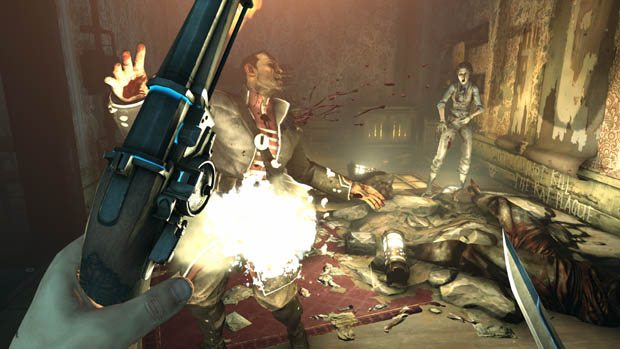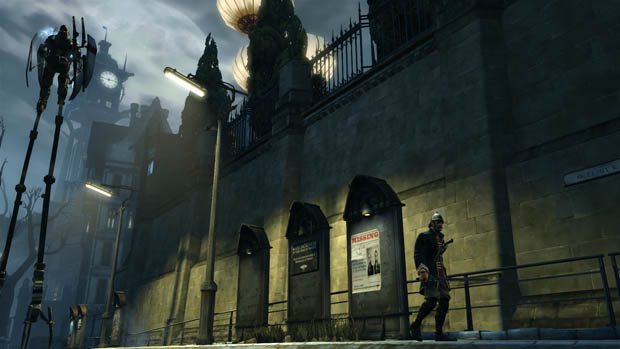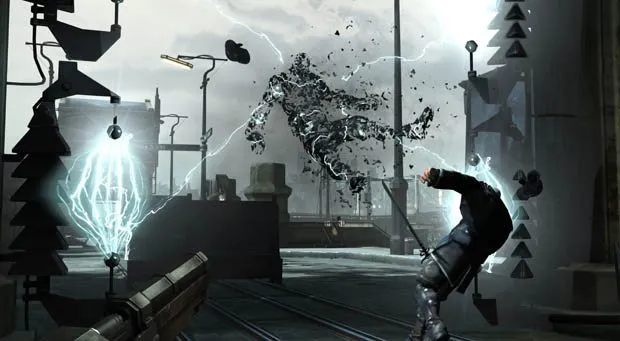Follow the video games industry close enough, and you’ve likely heard that single player games are dying. The reasoning behind this being that solitary single player experiences don’t offer enough of a value proposition for players. It’s true, we are gaming in the multiplayer generation, but there have been some great single player experiences this generation as well. The trick that the great single player games perform is to give players such a great experience in a single play through, that they want to come back and do it again. And that’s just what Arkane Studios has accomplished with the debut of their stealth/action/first-person adventure, Dishonored.
Dishonored tells the tale of Corvo Attano, a bodyguard for the Empress of Dunwall. Corvo is framed for her murder and trapped in the middle of a political power play, with two factions vying for control of the city. Corvo’s mission is to clear his name and make sure the rightful heir to throne takes their place. The city of Dunwall is your playground in Dishonored, and has a unique steampunk vibe that is said to be modeled after 17th century London. This city and its inhabitants are currently stricken with disease, and are being policed at all times to keep the infection from spreading. There’s definitely an Orwellian Dystopian vibe going on in Dishonored, where the powers that be have complete control over the city’s inhabitants of which many live in squalor and pestilence.

A first person stealth title at its roots, Dishonored is a mission based sandbox title that limits you only to your creativity when tackling challenges. The game is checkpoint based, but how you get to those checkpoints is completely up to you. You are judged by Chaos in Dishonored, a value at the end of each of the game’s nine missions, that measures the actions that you took to complete your objectives. Alerting enemies, killing them, allowing bodies to found, and other generally violent actions that you take in a mission will raise your chaos level, it will also alter the outcome of the story within the game. Dishonored gives you the choice to be a patient lurking shadow, or a brazen visible hero, so long as you get the job done.
It’s easier to take the violent approach in Dishonored, as Corvo is a more than capable assassin with a ton of fun power-ups to take advantage of. That’s not where the real fun in Dishonored is however. Keeping an eye on your Chaos causing ways is a more rewarding approach, because of Arkane’s keen focus on stealth gameplay. Driven by vision cones and the AI’s ability to hear you if you make too much noise, Dishonored takes an approach to stealth that is entirely its own. The gameplay isn’t what you think of when you think of a traditional stealth title though. It isn’t about hiding in the shadows and learning enemy patterns. It’s more dynamic than that, making you think on your feet to avoid being detected while completing your missions. You can zip past guards when they turn their eyes from you, stop time completely, or even posses animals or humans and sneak through restricted areas or small openings. Or you can pull out your sword and kill everyone in your path. Regardless of which way you decide to build your character, you’ll have the skills necessary to play any way you want, as most skills work equally well in stealthy and action oriented playthroughs.
On the action-oriented side of things, Dishonored has a brutal combat system, which has the hero wielding both a sword and a projectile weapon. Most battles turn into melee sword clashes, with the occasional guard pulling a pistol on you as well. Since Dunwall is heavily policed, there’s usually more than one guard on patrol, and that goes double if any of them make it to the alarm. But there are many ways to dismantle your enemies outside of just fighting them head on. If you have no qualms with letting your enemy know that you are there, you can use things like grenades, and shrapnel bombs if you want to take the violent approach. Or you can get sneaky and turn their own defenses on them by rewiring their own traps. The beautiful thing about Dishonored is that there’s never an ultimatum of how you need to do things, you can choose right down to the very last mission, how you want to complete the game. That is of course if you do more than run straight to your waypoint and explore the many details of each mission.

Dishonored will dig its hooks in with its gameplay, but it might not come until after you’ve already been through the entire game, and have learned the nuances of your skills. Each mission has more than meets the eye in terms of content, whether that be in the form of hidden areas, puzzles to solve, locked doors/safes to open, collectibles to find, etc. Arkane fosters this with a tool that helps expand each mission in terms of both content and story. They do this by using a beating heart that not only helps you identify secrets or collectibles, but tells backstory in the process as well. Equipped like any other item in the game, the heart will show you the location of magic runes which are used to upgrade your skills, bone shards that are skill buffs, and other items that are necessary in upgrading your character. These are numerous throughout the story, but are entirely optional to pick up, but with the way it is implemented you’ll likley be pulling the heart out quite often in Dishonored. Aim this heart at an NPC, building, or other part of the world, and a soothing voice will tell you the backstory of that character or location, which is a really nice touch for those who want even more color added to the world. The magic runes that you discover can be traded in for skills or upgrades to existing abilities. The skill list to choose from is comparatively small when looking at other games, but very concise at the same time. You’ll be able to scrape by with the runes that you stumble across, but some can be very difficult to find. Once you get a taste of the power possibilities, you’ll be pulling the heart out often and the game will encourage you to do so if you are in proximity of a magic rune or bone shard. The progression system definitely scales well as the story unfolds in Dishonored, your character becomes more skilled, enemies get somewhat tougher, and new enemy types are introduced to keep you on your toes as well as expand what is a pretty exceptional story.
It’s a story where everything feels in place. One that doesn’t get bloated with unnecessary scenes, that has a nice flow right down to the very end. It’s probably because there’s alot less uncontrollable cinematic sequences, and a lot more world enhancement details that are told throughout the game. You’ll hear citizens and guards chattering about the world, an omnipresent public address system that is constantly updating Dunwall’s inhabitants and “protectors” with new information. These serve as a better story telling mechanics than what is traditionally used to convey similar detail in other games. As mentioned above, item usage also plays into the story telling in Dishonored in a big way. The Heart being able to tell you everything about an area that you are in, or an NPC in the world is a really interesting story telling device. Being able to quickly transition between your equipped weapons and this item probably goes a long way in actually using this the way it was intended. In fact, all the skills fall into this category of easy to access and use, with the controls being intuitive for making use of so many different abilities of your character.
Dishonored is a game that simply must be played more than once to truly be appreciated. There are so many ways that missions can be accomplished, that you’d be doing yourself a disservice if you didn’t see at least one alternative. Which is the trick that a lot of single player games can’t pull. Because of there’s so few game developers with the talent to do that, it’s amazing that a game like this even gets the green light in this day and age. Dishonored is refreshing, thoughtful, measured, and unique. It’s a reason for gamers to keep supporting developers that are willing to go out and try new things, to tell stories that haven’t been told a thousand times before, even if that is through unconventional mechanisms. We’ll mourn the day when single player games officially die, but when/if they do, it’s games like Dishonored we’ll miss the most.











Published: Oct 8, 2012 01:44 am